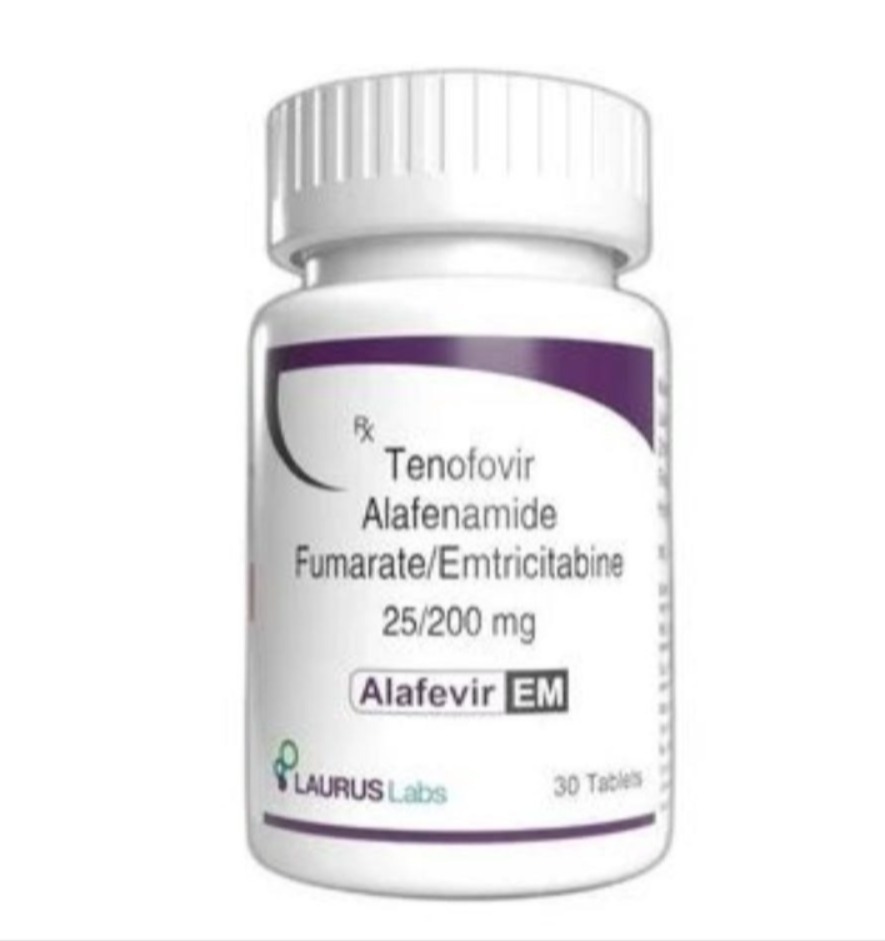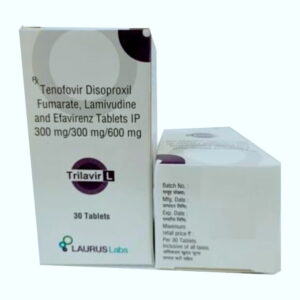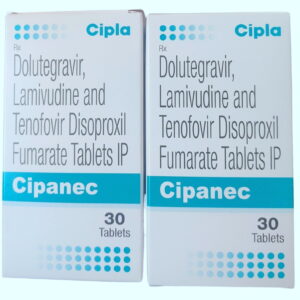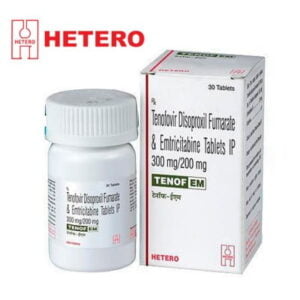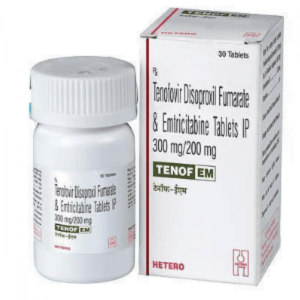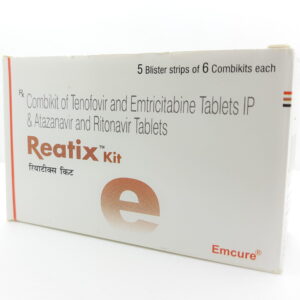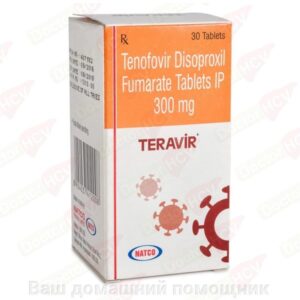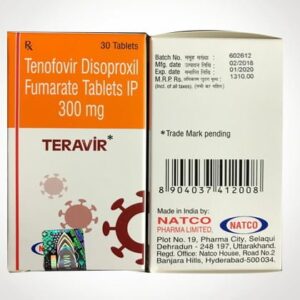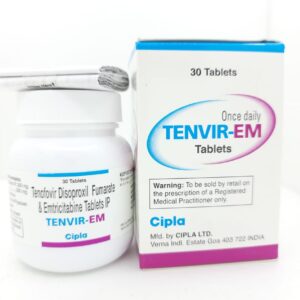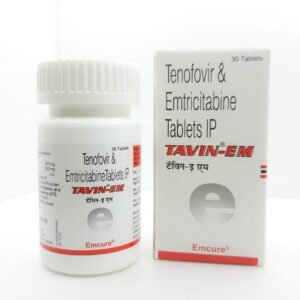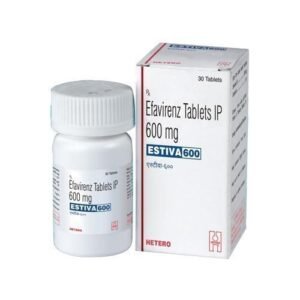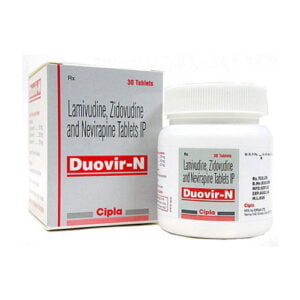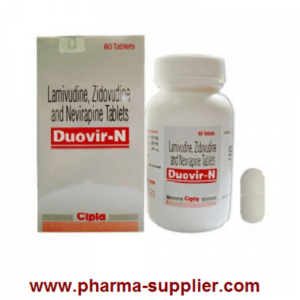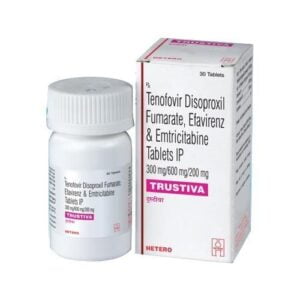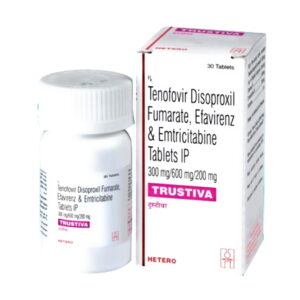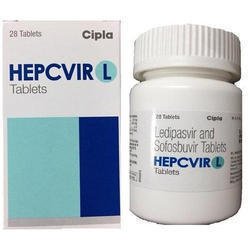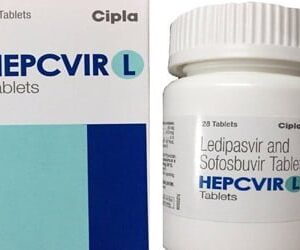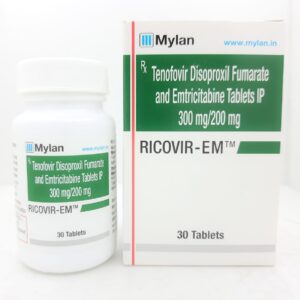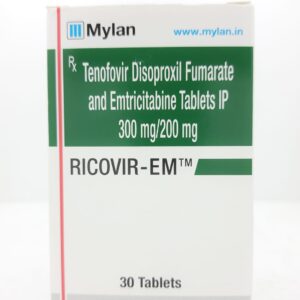Last Updated on September 2, 2024 by admin
Introduction to Alafevir EM Tablet
Alafevir EM Tablet is an antiviral medication primarily prescribed for the treatment of chronic hepatitis B virus (HBV) infection in adults. Developed and manufactured by the pharmaceutical company Gilead Sciences, Alafevir EM Tablet is notable for its active ingredient, tenofovir alafenamide. This compound plays a crucial role in managing the replication of the hepatitis B virus, thus helping to control the infection and its associated complications.
This medication is administered in the form of a tablet, which makes it straightforward and convenient for daily use. The mechanism of Alafevir EM Tablet involves inhibiting the HBV DNA polymerase enzyme. By doing so, it effectively blocks the virus’s ability to replicate within the body’s liver cells, thereby reducing viral load and lessening liver inflammation and damage over time.
With its targeted action, Alafevir EM Tablet offers a more focused delivery of tenofovir alafenamide to the liver, which is the primary site of HBV replication. This leads to improved therapeutic outcomes with potentially lower doses than previous antiviral treatments, minimizing side effects and increasing patient compliance. Besides managing chronic hepatitis B, the use of Alafevir EM Tablet is also associated with delaying the progression of liver-related health issues such as cirrhosis and liver cancer, further underscoring its significant medical benefits.
In summary, Alafevir EM Tablet serves as a critical advancement in the antiviral treatment landscape for chronic hepatitis B. Through its targeted mechanism, lower dosage requirements, and reduced side effects, it provides an essential option for affected adults looking to manage their condition effectively.
Uses of Alafevir EM Tablet
Alafevir EM Tablet, also known by its generic name as Tenofovir alafenamide, is primarily prescribed for the treatment of chronic hepatitis B virus (HBV) infection in adults. Chronic hepatitis B is a long-term viral infection that affects the liver, potentially leading to severe conditions such as cirrhosis, liver failure, and hepatocellular carcinoma. The primary aim of Alafevir EM Tablet is to mitigate these risks by effectively reducing the viral load in the body and improving overall liver function.
By inhibiting the reverse transcriptase enzyme, Alafevir EM Tablet prevents the virus from replicating within liver cells. This reduction in viral replication translates to a lower viral load, leading to improved liver histology and a decrease in liver inflammation and fibrosis. Clinical studies have demonstrated that patients taking Alafevir EM Tablet experience significant declines in HBV DNA levels, which is a key indicator of the drug’s efficacy. Moreover, it has been observed that Alafevir EM Tablet offers a better safety profile compared to its predecessor, Tenofovir disoproxil fumarate (TDF), particularly in terms of bone and renal safety.
Besides its primary use for managing chronic hepatitis B, Alafevir EM Tablet is also being investigated for potential off-label uses. While currently less common, some research is exploring its efficacy in treating hepatitis delta virus (HDV) co-infection due to its potent antiviral properties. Additionally, preliminary studies suggest that Alafevir EM Tablet could be beneficial in reducing HBV reactivation in individuals undergoing immunosuppressive therapies, although further research is needed to establish definitive guidelines.
Alafevir EM Tablet is typically prescribed as part of a comprehensive treatment plan tailored to each patient’s specific medical condition. Healthcare professionals usually recommend regular monitoring, including liver function tests and HBV DNA levels, to ensure optimal therapeutic outcomes and early detection of any potential side effects.
Directions for Use
When initiating treatment with Alafevir EM Tablet, adherence to the prescribed dosage and schedule is crucial for maximizing its therapeutic efficacy. The recommended dosage is one tablet taken once daily, which ensures consistent blood levels of the medication for optimal suppression of the hepatitis B virus. It is important to ingest the tablet whole, with the recommendation to take it with food to enhance absorption, which may lead to better therapeutic outcomes.
An essential aspect of Alafevir EM Tablet administration is maintaining regularity in its intake. Missing doses may compromise the medication’s effectiveness, potentially leading to drug resistance or decreased viral suppression. If a dose is missed and it is close to the time of the next dose, it is generally advised to skip the missed dose and proceed with the regular dosing schedule. Doubling up on doses to compensate for a missed one is not recommended, as it could increase the risk of adverse effects.
Ingesting Alafevir EM Tablet with food not only aids absorption but also minimizes gastrointestinal upset, enhancing the overall tolerability of the treatment. Patients are advised to swallow the tablet whole with a full glass of water, without attempting to crush, chew, or split it. Maintaining a daily routine that aligns with meal times can support adherence and foster a sense of consistency for the patient.
Regular follow-up appointments with healthcare providers are vital to monitor the efficacy of Alafevir EM Tablet and to make any necessary adjustments in the treatment plan. These check-ups offer an opportunity to address any concerns, manage side effects, and streamline the therapeutic regimen for the benefit of the patient.
Benefits of Alafevir EM Tablet
Alafevir EM Tablet, a medication primarily used for the treatment of chronic hepatitis B, has shown significant benefits that contribute to improved patient outcomes. Notable among these benefits is its ability to effectively reduce viral replication. This reduction leads to a decrease in the hepatitis B virus (HBV) levels in the blood, which is a critical factor in managing the disease.
Improved liver function is another substantial advantage of using Alafevir EM Tablet. By mitigating liver inflammation and reducing liver enzyme levels, Alafevir EM Tablet helps restore normal liver function over time. This improvement is crucial, given that chronic hepatitis B can lead to severe liver damage if left untreated.
In the long-term, Alafevir EM Tablet’s benefits extend to the prevention of liver cirrhosis and liver cancer. Chronic hepatitis B is a well-known risk factor for these life-threatening conditions. By maintaining low levels of HBV and preserving liver function, Alafevir EM Tablet plays a preventative role in the progression to cirrhosis and the development of hepatocellular carcinoma (HCC), a primary form of liver cancer.
Several clinical studies and trials have underscored these benefits. One such study demonstrated that patients taking 8208101406 experienced a significant and sustained reduction in HBV DNA levels compared to those on other treatments. Furthermore, long-term follow-up studies indicated a lower incidence of liver cirrhosis and HCC among patients consistently treated with Alafevir EM Tablet.
In summary, the benefits of Alafevir EM Tablet for individuals with chronic hepatitis B are well-documented and multifaceted. From reducing viral replication and enhancing liver function to its long-term preventative effects against severe liver diseases, Alafevir EM Tablet represents a cornerstone in the management of chronic hepatitis B, backed by robust clinical evidence.
Storage Instructions
Proper storage of Alafevir EM Tablet is essential to maintain its efficacy and ensure patient safety. To preserve the medication’s potency, it is recommended to store Alafevir EM Tablet in a cool, dry place, ideally at room temperature between 20°C to 25°C (68°F to 77°F). Brief excursions down to 15°C (59°F) and up to 30°C (86°F) are permissible; however, prolonged exposure to temperatures outside this range can compromise the medication’s stability.
Humidity can also affect the integrity of Alafevir EM Tablet. Therefore, avoid storing the medication in damp or humid environments such as bathrooms. It is best to store the medication in its original container, tightly closed, and away from any sources of moisture. Ensure that the bottle is kept in a location free from direct sunlight, extreme heat, and light exposure, as these conditions can degrade the active ingredients.
Safety is paramount when storing any medication, including Alafevir EM Tablet. Keep the medication out of reach of children and pets to prevent accidental ingestion, which can lead to serious health risks. Consider using a child-resistant container or a locked cabinet for added security. Additionally, inform all household members about the presence and location of the medication to avoid unintended access.
If Alafevir EM Tablet is inadvertently exposed to unsuitable storage conditions, such as extreme temperatures or high humidity, consult your healthcare provider or pharmacist for guidance on whether the medication remains safe to use. It is crucial not to consume Alafevir EM Tablet if there is any doubt about its integrity due to improper storage.
Adhering to these storage guidelines helps ensure that Alafevir EM Tablet remains effective throughout the prescription period, thereby providing the maximum therapeutic benefit to those who rely on it for their treatment regimen.
Medicinal Benefits
Alafevir EM Tablet, with tenofovir alafenamide as its active ingredient, presents significant medicinal benefits, particularly for individuals battling chronic hepatitis B virus (HBV) infection. At a molecular level, tenofovir alafenamide operates as a nucleotide reverse transcriptase inhibitor (NRTI). This mechanism involves the inhibition of reverse transcriptase, an enzyme crucial for the replication of HBV DNA. By blocking this enzyme, tenofovir alafenamide effectively impedes the viral replication process, thereby reducing the viral load within the patient’s body. This reduction in viral load is essential in mitigating liver damage and slowing the progression of hepatitis B.
The overall efficacy of tenofovir alafenamide in treating HBV is noteworthy. Clinical trials have demonstrated that Alafevir EM Tablet is highly effective in reducing hepatitis B virus DNA levels. Additionally, it has been observed to improve key liver function markers, such as alanine aminotransferase (ALT) levels, showcasing its direct benefit to hepatic health. Another advantage of Alafevir EM Tablet is its ability to maintain high intracellular concentrations of the active metabolite while minimizing systemic exposure, which contributes to a better safety profile compared to other treatments.
When comparing Alafevir EM Tablet with other antiviral drugs used in similar treatments, its benefits become even more apparent. Traditional therapies, such as tenofovir disoproxil fumarate (TDF), while effective, have been associated with a higher risk of renal dysfunction and bone mineral density loss. Alafevir EM Tablet, by contrast, demonstrates a lower incidence of these side effects due to its pharmacokinetic properties, making it a safer long-term treatment option for patients. Additionally, lamivudine and entecavir, other antivirals used for HBV treatment, often face challenges like drug resistance, which is less common with tenofovir alafenamide.
In summary, the pharmacological benefits of Alafevir EM Tablet, underpinned by tenofovir alafenamide, position it as a potent and safer alternative in the management of chronic hepatitis B, offering superior viral suppression and enhanced liver function with fewer adverse effects.
Drug Warnings and Safety Precautions
While Alafevir EM Tablet is an effective medication for the treatment of chronic hepatitis B, it is imperative to be aware of the drug’s warnings and safety precautions. Understanding these precautions can help mitigate risks and ensure safe usage.
First and foremost, Alafevir EM Tablet is contraindicated for individuals who are allergic to tenofovir alafenamide or any other component of the medication. In such cases, the use of this drug can lead to severe allergic reactions, requiring prompt medical intervention.
A significant concern associated with Alafevir EM Tablet is the potential for drug resistance. Continuous usage of antiviral drugs like Alafevir EM Tablet can sometimes lead to the development of drug-resistant strains of hepatitis B virus, diminishing the medication’s effectiveness. Therefore, it is crucial for healthcare providers to monitor patients’ viral loads regularly and adjust treatment as needed.
Pre-existing health conditions can also necessitate caution when using Alafevir EM Tablet. Individuals with liver disease, including cirrhosis, should be carefully monitored, as Alafevir EM Tablet can exacerbate liver conditions. Those with renal impairment must exercise caution too, since the active ingredient, tenofovir alafenamide, is processed through the kidneys. Adjusted dosing and regular kidney function tests may be required in these patients.
Furthermore, it is important to discuss potential life-threatening side effects that warrant immediate medical attention. Severe side effects may include lactic acidosis and hepatomegaly with steatosis—conditions characterized by high levels of lactic acid in the blood and enlarged, fatty liver, respectively. Symptoms of lactic acidosis, such as muscle pain, trouble breathing, and feeling weak or tired, should be addressed urgently. Any signs of liver problems, such as dark urine, yellowing of the skin or eyes (jaundice), and severe stomach pain, also demand immediate medical evaluation.
Patients should maintain open communication with their healthcare providers and report any unusual symptoms promptly. Vigilance and adherence to safety precautions can significantly enhance the therapeutic benefits while minimizing potential risks associated with Alafevir EM Tablet.
Drug Interactions and Interaction Checker
When taking Alafevir EM Tablet, it is crucial to be aware of potential drug interactions that might affect its efficacy or heighten the risk of adverse effects. Alafevir EM Tablet, generically known as tenofovir alafenamide, can interact with various medications, both prescribed and over-the-counter, as well as with herbal supplements. Understanding these interactions enables patients to use Alafevir EM Tablet safely and effectively.
Commonly prescribed medications that may interact with Alafevir EM Tablet include certain antiretrovirals and common antibiotics. For instance, some antiretroviral medications used in treating HIV, such as lopinavir/ritonavir, may alter the levels of Alafevir EM Tablet in the bloodstream. Additionally, certain drugs prescribed for tuberculosis, including rifamycins, can decrease Alafevir EM Tablet’s effectiveness by accelerating its metabolism.
Beyond prescription drugs, over-the-counter medications such as nonsteroidal anti-inflammatory drugs (NSAIDs) like ibuprofen or naproxen can pose potential risks. Concurrent use with Alafevir EM Tablet might increase the likelihood of kidney damage, a significant concern for patients with pre-existing renal conditions.
Herbal supplements, while often perceived as benign, are not free from interaction risks. For example, St. John’s Wort, a common herbal remedy for depression, can reduce the concentration of Alafevir EM Tablet in the body, decreasing its effectiveness in managing hepatitis B. Likewise, supplements containing high doses of garlic or ginseng might also lead to unexpected side effects when combined with Alafevir EM Tablet.
To mitigate these risks, it is recommended that patients utilize drug interaction checkers – online tools designed to identify and manage potential interactions. These checkers require input of all medications and supplements being taken, providing immediate feedback on possible adverse interactions. Furthermore, consulting with healthcare providers before starting or stopping any new drug or supplement is a critical precaution to ensure that Alafevir EM Tablet continues to work effectively without compromising safety.
In conclusion, understanding and managing drug interactions with Alafevir EM Tablet is vital for optimal treatment outcomes. Patient awareness and proactive use of interaction checkers can significantly contribute to safe and effective therapy.
Side Effects of Alafevir EM Tablet
Alafevir EM Tablet, though vital for managing chronic hepatitis B, is not free from side effects. Understanding these potential adverse reactions is crucial for ensuring patient safety and effective treatment.
Common Side Effects: Some side effects of Alafevir EM Tablet are relatively common but generally mild. These include headache, fatigue, stomach pain, nausea, and diarrhea. While these symptoms can be uncomfortable, they are usually manageable and tend to diminish as the body adjusts to the medication. Maintaining hydration, eating small, frequent meals, and resting can help mitigate these effects.
Moderate to Severe Side Effects: While less frequent, moderate to severe side effects warrant closer monitoring. These can manifest as back pain, increased liver enzymes, or kidney problems, indicating the need for regular medical check-ups. It’s crucial to inform healthcare providers of any pre-existing conditions that might exacerbate these side effects. Engaging in routine blood tests can assist in detecting and addressing these issues promptly.
Rare but Serious Side Effects: Rarely, Alafevir EM Tablet can lead to severe conditions such as lactic acidosis, a buildup of lactic acid in the blood, and severe liver problems. Symptoms of these conditions include severe fatigue, muscle pain, abnormal breathing, jaundice, and unexplained weight loss. Immediate medical intervention is essential upon noticing any of these symptoms to prevent potential complications.
Management of minor side effects can often be handled with self-care measures, like adequate hydration and rest. However, for more severe reactions, it is imperative to seek medical attention promptly. Physicians might adjust the dosage or provide additional treatment options to alleviate symptoms without compromising the therapeutic efficacy of Alafevir EM Tablet.
As with any medication, staying informed and proactive about side effects plays a pivotal role in achieving a balanced and effective treatment regimen while ensuring patient safety.
How Alafevir EM Tablet Works
Alafevir EM Tablet, commonly known for its active ingredient tenofovir alafenamide, serves a critical role in the treatment of chronic hepatitis B. This antiviral medication is engineered to inhibit the replication of the hepatitis B virus (HBV), thus aiding in the management and potential suppression of the disease.
Understanding the mechanism of action begins with recognizing how tenofovir alafenamide operates at a cellular level. Once ingested, Alafevir EM Tablet is metabolized in the liver, where it becomes activated. In this form, tenofovir alafenamide targets the hepatitis B virus by integrating into the viral DNA. This integration disrupts the virus’s ability to replicate effectively. Specifically, it inhibits the activity of the HBV polymerase enzyme, which is essential for viral replication and lifecycle continuation.
By obstructing this enzyme, Alafevir EM Tablet helps to reduce the viral load in the liver. A decreased viral load means that fewer virus particles are present to infect new cells, effectively slowing the progression of hepatitis B. This not only helps in managing the infection but also reduces the risk of complications such as liver damage, cirrhosis, and hepatocellular carcinoma.
Furthermore, beyond its direct antiviral effects, Alafevir EM Tablet also bolsters the immune system’s ability to fight the infection. By maintaining a lower level of the virus, the immune system can more effectively target and eliminate infected liver cells. This supportive role in immune response is crucial as it aids in achieving a sustained suppression of the virus.
In summary, Alafevir EM Tablet works through a dual mechanism: it directly inhibits the replication of the hepatitis B virus and assists the immune system in combating the infection. This comprehensive approach makes it a valuable tool in managing chronic hepatitis B, supporting both viral suppression and long-term liver health.
General Warnings and Safety Advice
When taking Alafevir EM Tablet, it is imperative to be aware of several general warnings and safety advice to ensure optimal treatment efficacy and minimize potential risks. Individuals prescribed Alafevir EM Tablet should exercise caution regarding their daily activities, dietary habits, and health monitoring routines.
Firstly, patients are advised to avoid activities that require sharp focus or coordination, such as operating heavy machinery or driving until they understand how Alafevir EM Tablet affects them. Dizziness or fatigue may occur as side effects, impacting one’s ability to perform these tasks safely.
Dietary considerations are also essential while on Alafevir EM Tablet treatment. Some individuals may need to avoid alcohol intake as it can exacerbate potential liver-related side effects. It is crucial to maintain a balanced diet, focusing on nutrient-rich foods to support overall health and aid in the management of Hepatitis B, the primary condition treated by Alafevir EM Tablet.
The impact of Alafevir EM Tablet on pregnancy and breastfeeding requires careful deliberation. It is not completely known whether Alafevir EM Tablet can harm an unborn baby, hence it is advised that pregnant women inform their healthcare provider before starting this medication. For breastfeeding mothers, it is crucial to discuss the potential risks and benefits with a healthcare professional, as it is unknown if Alafevir EM Tablet passes into breast milk.
Regular monitoring is an integral component of the treatment plan with Alafevir EM Tablet. Patients will need regular blood tests to evaluate liver function and to monitor the progression of Hepatitis B infection. Consistent follow-up with healthcare providers helps in adjusting dosages and preventing any adverse effects.
In summary, adhering to these general warnings and safety advice while taking Alafevir EM Tablet is crucial for effective management of Hepatitis B and for maintaining overall health. Always consult with healthcare professionals who can provide guidance tailored to individual health profiles.
SAFETY ADVICE
![]() Alcohol
Alcohol
CONSULT YOUR DOCTOR
It is not known whether it is safe to consume alcohol with Alafevir EM Tablet. Please consult your doctor.
![]() Pregnancy
Pregnancy
SAFE IF PRESCRIBED
Alafevir EM Tablet is generally considered safe to use during pregnancy. Animal studies have shown low or no adverse effects to the developing baby; however, there are limited human studies.
![]() Breastfeeding
Breastfeeding
SAFE IF PRESCRIBED
Alafevir EM Tablet is probably safe to use during breastfeeding. Limited human data suggests that the drug does not represent any significant risk to the baby.
![]() Driving
Driving
UNSAFE
Alafevir EM Tablet may decrease alertness, affect your vision or make you feel sleepy and dizzy. Do not drive if these symptoms occur.
![]() Kidney
Kidney
CAUTION
Alafevir EM Tablet should be used with caution in patients with kidney disease. Dose adjustment of Alafevir EM Tablet may be needed. Please consult your doctor.
![]() Liver
Liver
SAFE IF PRESCRIBED
Alafevir EM Tablet is probably safe to use in patients with liver disease. Limited data available suggests that dose adjustment of Alafevir EM Tablet may not be needed in these patients. Please consult your doctor.
![]() CHILDREN CAUTION
CHILDREN CAUTION
UNSAFE
Alafevir EM Tablet is not recommended for use in children and adolescents below 18 years.
![]() Alafevir EM Tablet Habit Forming : NO
Alafevir EM Tablet Habit Forming : NO
![]() expert advice
expert advice
WHAT IF YOU FORGET TO TAKE Alafevir EM Tablet?
If you miss a dose of Alafevir EM Tablet, take it as soon as possible. However, if it is almost time for your next dose, skip the missed dose and go back to your regular schedule. Do not double the dose.• You have been prescribed Alafevir EM Tablet for the treatment of chronic hepatitis B virus (HBV) infection.
- In combination with other medicines, it is used for the treatment of HIV infections.
- Take it with food, as this increases the absorption of the medicine into the body.
- Alafevir EM Tablet may cause dizziness or sleepiness. Do not drive or do anything requiring concentration until you know how it affects you.
- You may still develop infections or other illnesses associated with viral infection while taking this medication.
- You can also pass on HIV or HBV to others. Don’t share needles or personal items that can have blood or body fluids on them.
- During treatment and for at least six months after stopping this medicine, regular blood tests are needed to monitor your liver function, level of hepatitis B virus and blood cells in your blood.
Diet and Lifestyle Recommendations
Complementing Alafevir EM Tablet treatment with appropriate diet and lifestyle choices is essential for optimizing health outcomes and enhancing the efficacy of the medication. While Alafevir EM Tablet is primarily used to manage chronic hepatitis B, supportive measures through diet and lifestyle can aid in better management of the condition and improve overall well-being.
A balanced diet rich in fruits, vegetables, whole grains, and lean proteins can provide the necessary nutrients to support liver health. Including foods high in antioxidants, such as berries, nuts, and leafy greens, can help reduce oxidative stress on the liver. It is equally important to limit the intake of processed foods, trans fats, and excessive sugars, as these can contribute to liver fat accumulation and negatively impact liver function.
Alcohol consumption should be minimized or eliminated altogether when undergoing treatment with Alafevir EM Tablet. Alcohol can exacerbate liver damage and interfere with the effectiveness of the medication. If total abstinence is challenging, it is advisable to consult with a healthcare provider to determine a safe level of consumption, tailored to individual health conditions.
Engaging in regular physical activity is another crucial aspect of a supportive lifestyle while on Alafevir EM Tablet. Exercise can contribute to maintaining a healthy weight, improving cardiovascular health, and reducing the risk of complications associated with chronic hepatitis B. Aim for at least 150 minutes of moderate-intensity aerobic activity or 75 minutes of vigorous-intensity activity per week, as recommended by health authorities.
Additionally, stress management techniques such as mindfulness, meditation, and adequate sleep can play a significant role in enhancing overall health. Chronic stress can adversely affect the immune system and liver function, making stress reduction strategies particularly beneficial for individuals with hepatitis B.
Together, these diet and lifestyle recommendations form a comprehensive approach to complement Alafevir EM Tablet treatment, offering a holistic pathway to improved health and well-being.
REFERENCES:
- Barbara G. Wells, Joseph T. DiPiro, Terry L. Shwinghammer, Cecily V. DiPiro. Hepatitis, viral. Pharmacotherapy Handbook. Ninth edition. Page- 217.
- Lesley J. Scott, Henry L. Y. Chan. Tenofovir alafenamide- A review in chronic hepatitis B. Drugs. Springer Link. [Revised in June 2017]. [Accessed on 25th June 2022] https://link.springer.com/article/10.1007/s40265-017-0754-9
- Adrian S Ray, Marshall W Fordyce, Michael J M Hitchcock. Tenofovir alafenamide: A novel prodrug of tenofovir for the treatment of Human Immunodeficiency Virus. NIH National Library of Medicine, National center for biotechnology information. Pubmed.gov. January 2016. [Accessed on 25th June 2022] https://pubmed.ncbi.nlm.nih.gov/26640223/
- Gilead Sciences Ireland UC. Electronic Medicines Compendium (EMC). [Revised in January 2021] [Accessed on 25th June 2022] https://www.medicines.org.uk/emc/files/pil.2314.pdf
- Gilead Sciences, Inc. U.S. Food & Drug Administration. [Revised in April 2020] [Accessed on 25th June 2022] https://www.accessdata.fda.gov/drugsatfda_docs/label/2020/208464s008lbl.pdf

